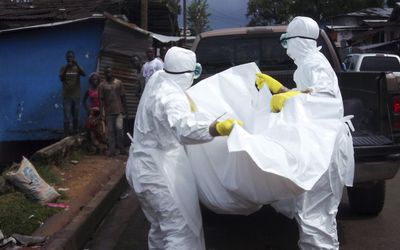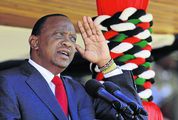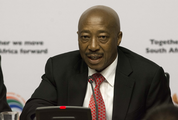NURSES at a downtown Monrovia hospital were about to punch out from work late one November afternoon when a feverish teenager, convulsing and bleeding from his mouth, stumbled into the waiting room.
For Mosoka Fallah, the boy’s symptoms pointed in a grimly familiar direction. He drove off — speeding in the wrong lane and dodging head-on traffic — to a meeting of government officials in the centre of the capital, where he burst into the room with the news: Ebola is back.
Twice this year, Liberia, the worst hit of all Ebola-affected nations with at least 4,800 deaths blamed on the disease, has been declared Ebola-free, only to see new cases appear. Liberian officials and medical researchers now wonder how soon their country and its neighbours will be completely rid of the scourge.
The World Health Organisation (WHO) judges a country "free of Ebola transmission" when 42 days pass without a new case of the haemorrhagic fever. The African nations most affected by the disease — Liberia, Sierra Leone and Guinea — have struggled mightily for the designation, an international clean bill of health that means they can at last turn the corner on an epidemic that has taken the lives of more than 11,300 people.
But with new instances of the disease in Liberia, doctors and public-health officials in West Africa now face another prognosis. While another large Ebola outbreak is highly unlikely due to enormous progress in detecting and responding to the disease, patients infected with the virus may continue to walk through hospital doors for months, possibly years, to come.
For a nation such as Liberia, where per capita annual gross domestic product is $900, that prospect represents a calamity.
Government officials in this Ebola-exhausted country are facing the prospect that they will keep spending money and manpower battling a virus that won’t go away.
"‘Ebola-free,’ or not ‘Ebola-free’ — we’re going to be living with Ebola for a long time," said the national coordinator of the country’s Ebola Task Force, James Dorbor Jallah.
Recent scientific studies and case reports indicate the Ebola virus can persist in survivors’ bodily fluids — semen, breast milk, spinal fluid, inner-eye fluid — months longer than previously thought.
A study under way in Sierra Leone will search for evidence of the virus in still other bodily fluids, including vaginal secretions, saliva, tears, sweat and urine, said Barbara Marston, who leads the international task force for Ebola response for the US Centres for Disease Control and Prevention.
Dr Marston and other researchers say there is no risk of contracting the virus through casual contact with survivors. But the flare-up of Ebola cases in Liberia underscores some of the questions still surrounding the virus — for instance, whether people can contract Ebola without developing symptoms.
The outbreak of new Ebola cases in Liberia has demoralised the country’s already spent, thinly staffed health ministry. Just months ago, doctors said they were looking forward to the day when they could focus again on relieving Liberia’s long-running health problems instead of battling Ebola.
Some 15% of all Liberian children here die before their first birthday, according to the UN Children’s Fund. The country also has some of the world’s highest rates of maternal mortality, malnutrition and post-traumatic stress disorder, the latter dating back to a 14-year civil war.
Instead, the return of Ebola has forced the postponement for a second straight year of children’s immunisations campaigns, said Sheldon Yett, Unicef’s country representative. Hospital staff are scared to come to work, much as they were a year ago, he said.
"We have to prepare ourselves psychologically that this isn’t something that is going to just disappear," said the nation’s weary chief medical officer, Francis Kateh, as he stepped out of the car.
A second later, Dr Kateh, his face creased with exhaustion, realised he had misplaced his bag and turned back towards his car. From a passing vehicle a man shouted: "Dr Kateh, you running around like a chicken!"
As Liberia grapples with the implications of a long struggle against Ebola, Guinea is on track this month, if no new cases appear, to be declared Ebola-free, joining Sierra Leone, which was given the designation in November.
Some medical workers believe, however, the designation lulls health workers and citizens into a false sense of security. The WHO defends the use of the label, saying it encourages governments to bring cases down to zero and helps countries reassure potential investors in their battered economies.
"I think it is extremely important to be able to note that they have interrupted transmission," said Bruce Aylward, the agency’s executive director of outbreaks and health emergencies.
Liberia illustrates the vagaries of the status. It thought it had succeeded in vanquishing Ebola in May, when it was first declared free of Ebola transmission. The announcement occasioned a nationwide rejoicing, with women’s church groups — calling themselves "prayer warriors" — marching through Monrovia’s streets singing in celebration.
A month later, however, the sense of national accomplishment evaporated when the body of a dead teenager was found on a road. His remains later tested positive for Ebola.
In September, the WHO declared Liberia Ebola-free yet again, only to have a fever-riddled teenager show up in the downtown hospital waiting room last month.
Dr Fallah, the physician who drove off to deliver the news, said the boy’s mother had survived Ebola last year, then gave birth to a child in September. About two weeks after the birth, her husband fell ill with fever. He later tested positive for Ebola, raising the question whether childbirth presents a window when survivors of the disease can infect people close to them, Dr Fallah said.
"It is exhausting," he said. "Nobody knew these recurrences would happen."
On a recent morning, Dr Fallah was in the government’s Ebola command centre, surrounded by bone-weary health workers trying to monitor the condition and whereabouts of 139 potentially infected people. Some patients had slipped out of quarantine because nobody remembered to bring them breakfast. "Contacts not getting food!" screamed an angry worker.
A whiteboard listed 20 people still unaccounted for, several of whom seemed to have turned off their phones. Holding up a map of Monrovia, a city of 1-million people stretching across 160km², Dr Fallah pleaded to his staff, "I need you to find those people!"
More Africa news from The Wall Street Journal
More news from The Wall Street Journal
Premium access to WSJ.com: $1 a week for 12 weeks

Health workers remove the body of a man believed to have died from the Ebola virus at a street in Monrovia ion 2014. Picture: REUTERS
NURSES at a downtown Monrovia hospital were about to punch out from work late one November afternoon when a feverish teenager, convulsing and bleeding from his mouth, stumbled into the waiting room.
For Mosoka Fallah, the boy’s symptoms pointed in a grimly familiar direction. He drove off — speeding in the wrong lane and dodging head-on traffic — to a meeting of government officials in the centre of the capital, where he burst into the room with the news: Ebola is back.
Twice this year, Liberia, the worst hit of all Ebola-affected nations with at least 4,800 deaths blamed on the disease, has been declared Ebola-free, only to see new cases appear. Liberian officials and medical researchers now wonder how soon their country and its neighbours will be completely rid of the scourge.
The World Health Organisation (WHO) judges a country "free of Ebola transmission" when 42 days pass without a new case of the haemorrhagic fever. The African nations most affected by the disease — Liberia, Sierra Leone and Guinea — have struggled mightily for the designation, an international clean bill of health that means they can at last turn the corner on an epidemic that has taken the lives of more than 11,300 people.
But with new instances of the disease in Liberia, doctors and public-health officials in West Africa now face another prognosis. While another large Ebola outbreak is highly unlikely due to enormous progress in detecting and responding to the disease, patients infected with the virus may continue to walk through hospital doors for months, possibly years, to come.
For a nation such as Liberia, where per capita annual gross domestic product is $900, that prospect represents a calamity.
Government officials in this Ebola-exhausted country are facing the prospect that they will keep spending money and manpower battling a virus that won’t go away.
"‘Ebola-free,’ or not ‘Ebola-free’ — we’re going to be living with Ebola for a long time," said the national coordinator of the country’s Ebola Task Force, James Dorbor Jallah.
Recent scientific studies and case reports indicate the Ebola virus can persist in survivors’ bodily fluids — semen, breast milk, spinal fluid, inner-eye fluid — months longer than previously thought.
A study under way in Sierra Leone will search for evidence of the virus in still other bodily fluids, including vaginal secretions, saliva, tears, sweat and urine, said Barbara Marston, who leads the international task force for Ebola response for the US Centres for Disease Control and Prevention.
Dr Marston and other researchers say there is no risk of contracting the virus through casual contact with survivors. But the flare-up of Ebola cases in Liberia underscores some of the questions still surrounding the virus — for instance, whether people can contract Ebola without developing symptoms.
The outbreak of new Ebola cases in Liberia has demoralised the country’s already spent, thinly staffed health ministry. Just months ago, doctors said they were looking forward to the day when they could focus again on relieving Liberia’s long-running health problems instead of battling Ebola.
Some 15% of all Liberian children here die before their first birthday, according to the UN Children’s Fund. The country also has some of the world’s highest rates of maternal mortality, malnutrition and post-traumatic stress disorder, the latter dating back to a 14-year civil war.
Instead, the return of Ebola has forced the postponement for a second straight year of children’s immunisations campaigns, said Sheldon Yett, Unicef’s country representative. Hospital staff are scared to come to work, much as they were a year ago, he said.
"We have to prepare ourselves psychologically that this isn’t something that is going to just disappear," said the nation’s weary chief medical officer, Francis Kateh, as he stepped out of the car.
A second later, Dr Kateh, his face creased with exhaustion, realised he had misplaced his bag and turned back towards his car. From a passing vehicle a man shouted: "Dr Kateh, you running around like a chicken!"
As Liberia grapples with the implications of a long struggle against Ebola, Guinea is on track this month, if no new cases appear, to be declared Ebola-free, joining Sierra Leone, which was given the designation in November.
Some medical workers believe, however, the designation lulls health workers and citizens into a false sense of security. The WHO defends the use of the label, saying it encourages governments to bring cases down to zero and helps countries reassure potential investors in their battered economies.
"I think it is extremely important to be able to note that they have interrupted transmission," said Bruce Aylward, the agency’s executive director of outbreaks and health emergencies.
Liberia illustrates the vagaries of the status. It thought it had succeeded in vanquishing Ebola in May, when it was first declared free of Ebola transmission. The announcement occasioned a nationwide rejoicing, with women’s church groups — calling themselves "prayer warriors" — marching through Monrovia’s streets singing in celebration.
A month later, however, the sense of national accomplishment evaporated when the body of a dead teenager was found on a road. His remains later tested positive for Ebola.
In September, the WHO declared Liberia Ebola-free yet again, only to have a fever-riddled teenager show up in the downtown hospital waiting room last month.
Dr Fallah, the physician who drove off to deliver the news, said the boy’s mother had survived Ebola last year, then gave birth to a child in September. About two weeks after the birth, her husband fell ill with fever. He later tested positive for Ebola, raising the question whether childbirth presents a window when survivors of the disease can infect people close to them, Dr Fallah said.
"It is exhausting," he said. "Nobody knew these recurrences would happen."
On a recent morning, Dr Fallah was in the government’s Ebola command centre, surrounded by bone-weary health workers trying to monitor the condition and whereabouts of 139 potentially infected people. Some patients had slipped out of quarantine because nobody remembered to bring them breakfast. "Contacts not getting food!" screamed an angry worker.
A whiteboard listed 20 people still unaccounted for, several of whom seemed to have turned off their phones. Holding up a map of Monrovia, a city of 1-million people stretching across 160km², Dr Fallah pleaded to his staff, "I need you to find those people!"
More Africa news from The Wall Street Journal
More news from The Wall Street Journal
Premium access to WSJ.com: $1 a week for 12 weeks






















Change: -1.72%
Change: -1.82%
Change: -2.32%
Change: -1.44%
Change: -2.53%
Data supplied by Profile Data
Change: -1.33%
Change: -0.18%
Change: -1.70%
Change: 0.00%
Change: -0.20%
Data supplied by Profile Data
Change: 0.76%
Change: 0.01%
Change: 1.05%
Change: 1.46%
Change: 0.57%
Data supplied by Profile Data
Change: -1.49%
Change: -2.05%
Change: -3.24%
Change: -0.89%
Change: -1.84%
Data supplied by Profile Data